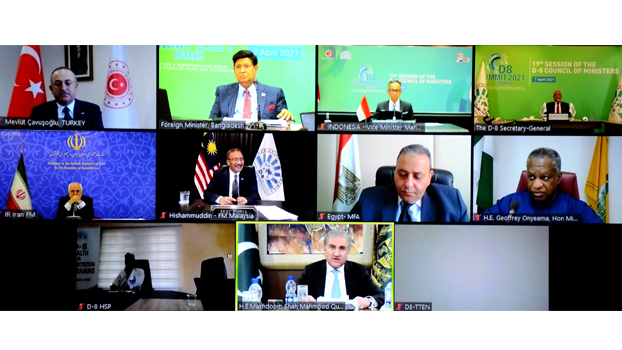Dhaka to make D-8 ‘more effective’

Bangladesh, after becoming the Chair of D-8 for the next two years, has announced to take “pragmatic initiatives” to make the eight Muslim countries grouping for economic cooperation “more effective”.
Foreign Minister Dr AK Abdul Momen made the announcement after taking the charge from his Turkish counterpart Mevlut Cavusoglu at the foreign ministers’ meeting held virtually on Wednesday, a day before the leaders’ summit.
Egypt, Indonesia, Iran, Malaysia, Nigeria, Pakistan, and Turkey are the other members of the grouping which was announced officially through the Istanbul Declaration of Summit of Heads of State/Government on June 15, 1997.
Bangladesh earlier held the chairmanship in 1999 to 2001. This time, the responsibility comes at a time when the country is celebrating the birth centenary of Father of the Nation Bangabandhu Sheikh Mujibur Rahman and the Golden Jubilee of Independence.
Bangladesh has also fulfilled the UN criteria for graduating from the LDC Group of countries recently.
“We are indeed honoured and happy for having the opportunity of chairing the D-8 at this historic moment,” the foreign minister said, seeking cooperation from all member states.
“Bangladesh will take all pragmatic initiatives to open new avenues of cooperation among the D-8 Member States with the aim of making this group even more vibrant, active and of course, effective”.
As the whole world is experiencing an unprecedented global public health and economic crisis caused by the COVID-19 pandemic, he also said that the D-8 Member States “need to stand together more than ever”.
The theme of the 10th D-8 Summit, which will be held on Thursday, is “Partnership for a Transformative World: Harnessing the Power of Youth and Technology”.
The foreign minister said the theme has been set keeping in mind that the youth of D-8 Member States would be fully prepared to reap benefit from the Fourth Industrial Revolution (4IR) and shall be equipped sufficiently to cope with the ever-changing world of Information and Communication Technology.
“As we all know that D-8 countries have a combined population of 1.1 billion people; of which 207 million, nearly 19 per cent, are aged between 15-24 years. We only need to tap the unbound potential of this youth turning the D8 into a vibrant, dynamic, and lively one,” he said.
“We (Bangladesh) are prioritising technical and vocational education to provide greater access to skills training for our future assets.”
Dr Momen said Bangladesh has become a popular destination for foreign students who want to pursue higher studies, including in technical studies.
“In this regard, I believe that the SEACO University Network will provide a good platform for emerging subjects including the 4IR, and it can also provide a stable online education platform for our students. Youth education and suitable employment are essential to harnessing the opportunities for economic growth associated with the demographic dividend. We need to train our youth in the skills needed for a future that is digital and innovation driven.”
He said D-8 requires taking leadership in this particular area to ensure job creation while equipping them with the right skills.
A D-8 incubation initiative might be a good option to consider. In this regard, Bangladesh strongly believes in enhancing knowledge-sharing and connectivity amongst D-8 Member States, he said.
“Since the overall objective of this global organisation is to improve Member States’ life and livelihood situation through multiple approaches, I earnestly hope to create a D-8 digital marketplace, and create a suitable-for-all resilient post-pandemic cooperation model to ensure the common interests of all member states,” he said.
“In order to minimise the worsening effects of Covid-19 on the world economy, Bangladesh would like to explore all avenues for economic recovery through collaboration among the D-8 Member States. Bangladesh believes in a free and equitable access to markets for not only products but also services.
“It would obviously facilitate D-8 governments and private sectors to come together to highlight how D-8 Member States can deepen connectivity, networking and collaboration in light of experiences of the Covid-l9 era,” said the foreign minister.




